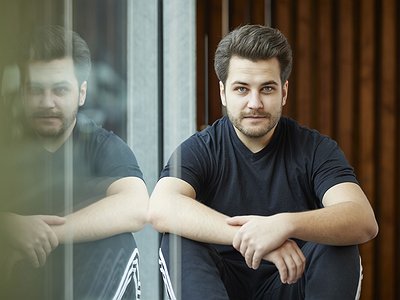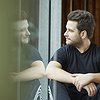Part 1
Name: Simon Oslender
Nationality: German
Occupations: Organist, keayboarder, pianist, composer, improviser
Current event: Simon Oslender's sophomore studio album Peace of Mind, also featuring bassist Will Lee and Wolfgang Haffner on drums is out via Leopard.
Recommendations: Kenny Werner - Effortless Mastery (Book); George Duke - Face The Music (Album)
If you enjoyed this interview with Simon Oslender and would like to know more about his work and current tour dates, visit his official homepage. You can also find him on Instagram, and Facebook.
When did you start writing/producing/playing music and what or who were your early passions and influences? What was it about music and/or sound that drew you to it?
There was always music all around me. My parents are both very musical people, my mom loves to sing and my dad plays the drums, guitar, a bit of piano and has a fantastic ear. There was always great music being played on the stereo - blues, classic rock, folk ...
I started banging away on pots and pans as a toddler and after seeing my dad play drums at a concert when I was 2 years old, I wanted a bass drum for Christmas. That round, warm, deep tone had somehow touched me. That fascination with the lower frequency spectrum has never stopped to this day - I'm in love with all things bass. My parents bought a children's drum kit and after getting that bass drum, I would receive one more part of the kit at a time for every birthday or Christmas.
Soon after, I started taking drum lessons and when I was 4 years old, my dad bought a live DVD of John Mayall And The Bluesbreakers. I couldn't stop watching it. Tom Canning, a fantastic musician from the States, was playing Hammond B3 organ on that gig and I fell in love with the instrument and its sound right from the start - that was the moment when I knew what I wanted to be doing for the rest of my life. Soon I got my first full-sized keyboard and the rest is history, as they say.
During the first few years I would learn the basics by ear, listening and playing along to my dad's blues and rock records that I loved: John Mayall, B.B. King, Eric Clapton, The Spencer Davis Group and many, many more.
It's hard to describe what exactly it was that drew me towards music because it all felt so natural at all times. There has not been one single moment of doubt about it in my life - music was and is everything for me. What fascinates me most about it is the fact that it is a universal language - it connects people from all parts of the world with all kinds of cultural backgrounds, religions, colors, ages - music can unite everyone the way nothing else can.
And then there's the way it is able to touch people and express emotions - through groove, melody and harmony. Hard to describe in words - but I think everyone knows that feeling when music just hits you right in your heart. There's nothing like it and it has always allowed me to express and process my emotions more profoundly than any other form of communication. And I think that's exactly what hit me when my dad first showed me that John Mayall DVD.
Some people experience intense emotion when listening to music, others see colours or shapes. What is your own listening experience like and how does it influence your approach to music?
Whenever I listen to music, I need to be touched by it somehow. Otherwise I'll probably stop listening or put on something else immediately. That's the only criterion that I have for music. No matter the genre, I consider music that is made with heart and soul to be good music. And I deeply believe that if you make music with love and stay true and honest in your art, you'll be able to touch people by telling your story.
That's exactly the goal I always set for myself when playing - every note needs to have a meaning, it needs to be played with love, care and honesty - nothing else counts. It's a life-long process but I try more and more every day because I want to transmit the same emotions that I experience when I hear music that touches me.
Listening to music can take me on an emotional adventure - it can evoke extreme sensations in soul, body and mind. And yes, I actually do see colors too. Not just when listening but especially when I play and compose. Certain keys, chords and sounds have certain colors that I associate them and their sound with. These colors influence the way I make music a lot, it's almost like painting a picture, searching for combinations of colors and textures that I like to create something special.
How would you describe your development as an artist in terms of interests and challenges, searching for a personal voice, as well as breakthroughs?
I am very grateful to say that apart from some highly demanding musical situations I haven't had to deal with any major challenges as an artist so far - I've been very lucky to be around fantastic people and musicians that have always supported and guided me.
Other than that, I'm just really enjoying the ride - it's absolutely mind-blowing to me that I get to make a living playing music and doing that with so many amazing musicians around the world. There's nothing better than that and I am eternally grateful for every single day - I see every fulfilling and inspiring musical experience as a breakthrough.
As far as searching for a personal voice, I strongly believe that you can't force that. You will always be yourself, there's no way (and no need!) to change that. If you surround yourself with music and musicians that you like and if you stay true to what you love, humble, open, curious and honest with yourself and others, your voice will show more and more.
Tell me a bit about your sense of identity and how it influences both your preferences as a listener and your creativity as an artist, please.
Who I am is how I play and listen to music. I'd say that I am emotionally sensitive and I have a deep longing for social (and musical) harmony, inner peace and positivity in my life. I love having a good time and keeping things simple yet meaningful. I don't like rationally overthinking things too much, I'd rather just risk something and either build on it if things work out or learn from it if things don't.
All that shows in my music naturally. I think the only way to really be yourself as a musician is to ignore all sorts of distractions - competition, trends and hypes, people who always seem to know what's best for you etc. - and just play the way you are.
It's not always easy but the more you let it happen, the more you will confidently feel like you belong. Nobody will ever be better at being you than you are so it's best to just embrace it.
What, would you say, are the key ideas behind your approach to music and art?
Love, communication and positive energy! That's something that I don't see enough in the younger jazz scene - playing and listening to music should be FUN in my opinion - what's wrong with having a good time while creating music together?
How would you describe your views on topics like originality and innovation versus perfection and timelessness in music? Are you interested in a “music of the future” or “continuing a tradition”?
Keeping the tradition and honoring the wonderful and iconic musicians that influenced me is really important to me. They shaped the development of music and I feel that it is my obligation and responsibility to respectfully honor the great music they have given us. Some people certainly confuse that with my music being old-fashioned. I consider it respectful.
I am definitely interested in moving the music forward - unfortunately I must admit that most new trends that I'm hearing don't really get to me. I have the feeling that an excessive focus on perfection and technique seems to outshine the core values that I have in music.
I am just going to keep making the music that I like to make - whatever it is going to be. It is always going to be original if I stay true to myself and if I can move people with it, I have reached my goal of keeping heart and soul alive in a world of auto-tune, 32nd note grids and computer-written songs.
Over the course of your development, what have been your most important instruments and tools - and what are the most promising strategies for working with them?
My first instrument was the drum kit and I still play drums all the time. Drumming is the foundation of my whole musical development. If something doesn't have a great groove and feel, it's not for me. The drums have shaped my time and the way I approach and play music on all instruments. Rhythm is everything - there's nothing worse than the right note in the wrong place ... (laughs)
The second key instrument was the Hammond organ, the beast. I could talk about that wonderful instrument all day long. I have a really nerdy fascination with it, I know all the technical details, the different models and the changes made to them over the years of production etc. - but most importantly, I just LOVE it - the sound, the look, the feel, even the smell! Sitting down at a Hammond organ feels like home to me. It shaped my harmonic thinking and sense of dynamics in a very orchestral way because of its unlimited sound possibilities and the fact that you play it with both hands and both feet.
Later on, there were many more important and inspiring instruments and tools like the grand piano, Fender Rhodes, Wurlitzer, several synthesizers and especially the computer which allowed me to get into recording, production and mixing. If I hadn't become a performing artist, I would probably be a recording and mixing engineer - that's my second love. I'm obsessed with producing, mixing, vintage gear and studio work in general.






